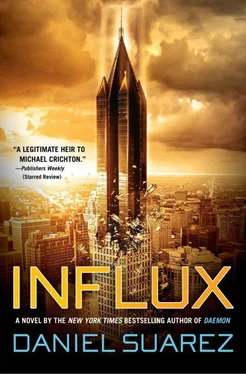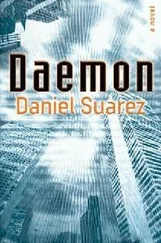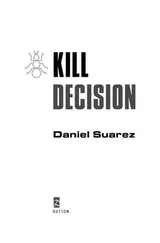The deputy director of the CIA put his hand on her shoulder. “They won, Kaye. Let it go. Let’s try to manage the aftermath. Bide our time.”
Monahan felt numb for the next half hour as the generals and intelligence chiefs tried to divide their PR problem into solvable pieces, but it all sounded like nonsense to her—like something the public would never believe. But then again, she had seen the truth and she didn’t believe that either. Monahan kept thinking that there must be some way she hadn’t yet thought of to react. Some strategy by which she could best the BTC.
But then there was a distant booming sound—and impossibly, water glasses on the table rippled, even though they were deep underground.
The generals and intelligence directors leapt up, looking up at the ceiling.
“What the hell is that?”
“Hedrick is coming for us. Jesus. If they can control gravity… they could rip us straight out of the ground!”
Monahan looked around the table at them. Panicked. They were all panicked.
One general shouted, “Continuity of government bunkers are no longer safe! We need to get out of here and spread out—go to separate locations. Or the heads of critical agencies are going to be wiped out all at once.”
Monahan followed them as if she were watching from a distance. Still in a daze. They put her on an electric cart with a couple of generals and a heavily armed security detail—all of the guards inexplicably wearing MOPP biological protection gear. She figured somebody must have grabbed the wrong binder. Or perhaps they didn’t have a binder for the scenario where Site R and all its high-value occupants fell into the sky.
As the cart came out of the huge gates at the bunker entrance, it skidded to a stop, and Monahan’s stupor served her well. She didn’t immediately lose her mind. Generals staggered around holding their heads in their hands, but she walked calmly, staring out at the shattered remains of main battle tanks and armored vehicles that had crashed into the forested slopes around them, leaving huge craters and fires behind, along with the body parts of hundreds of men, their corpses flash-frozen and then shattered like glass.
And she realized that the entire battalion had been thrown at them from the heavens by technological gods. Gods whom they’d angered.
Jon Grady awoke in acomfortable, modernist bedroom with a high-raftered ceiling with walls that didn’t rise high enough to meet it. As a result he could hear a distant television elsewhere in the loft. The sound of clattering pots and dishes.
Grady turned to see Alexa asleep, sitting in a chair across the bedroom, positron gun in her lap. He guessed she must have come in sometime during the night. Standing guard perhaps? He turned on his side and watched her sleeping, studying her face. The goddess Aphrodite had nothing on her.
With her eyes still shut Alexa said, “You’re freaking me out, Jon.”
He quickly looked away, coughing. “What was that?”
Alexa opened her eyes.
“You’re obviously still on guard.”
She sat up. “I don’t sleep much. Never have. I heard your door open in the middle of the night and checked up on you. Found the door open—you asleep. I’m not sure I entirely trust Cotton. You realize he could turn us in to save his own skin?”
Grady narrowed his eyes and then felt for the video device hung around his neck.
It was gone. He tore off the covers and searched the sheets.
“What’s wrong? What are you looking for?”
He leaned down to look alongside and then under the bed. Leaping out of it, he heaved and overturned the bed entirely. In a moment he came up with the silver chain on which he had hung the video device—a neat cut severing the loop, the clasp still in place. “Cotton…” He bolted out of bed, still wearing all of his clothes, and raced through the bedroom door.
Alexa was right behind him. “What’s wrong?”
“The video record from Hibernity is gone. It has everything!” He looked both ways in the hallway and realized the sounds he was hearing were coming from the large workshop, not the kitchen, and so he ran toward it.
She followed close behind.
Grady moved down the corridor. Glancing for any open doors but finding none, he walked all the way to the end, where the corridor opened to a truly enormous technical workshop. There were robotic arms by the dozen on tables and on shelves—in fact, whole domestic robots, and shelf after shelf of inscrutable high-tech components. Not a circuit board in sight—just solid, shimmering, optically strange metamaterials and coils of electropolymer muscle. The place was possibly a third of the entire floor—a good three thousand square feet.
Ahead Grady saw Richard Cotton sitting at a workbench, viewing some type of cellular culture through an electron microscope display. Nearby robotic arms performed precision movements over petri dishes.
“Cotton!”
The man turned and lifted up a crystal visor he wore on a strap around his head. “Whoa. What’s with all the shouting?”
Grady stomped up to him. “Where the hell is it?”
Cotton looked quizzically to Alexa. Then back to Grady. “Where is what?”
“My video device. The one that was around my neck.”
Cotton raised one eyebrow. “I don’t appreciate the tone.”
Grady grabbed him by his shirt and dragged him off his chair, toppling it. “I’m not fucking around! Tell me where it is! I know you have it.”
Cotton tried to protect the work on the table. “Damnit! Don’t disturb those cultures. You’re going to mess everything up.”
Alexa gazed at nearby workbenches and pointed to something held in place by a robotic clamp. “Is this it?”
Grady turned and felt relief upon seeing it—but then twice as much anger. He released Cotton, dropping him onto the floor, and moved to grab Chattopadhyay’s video device from the clamp. It was held fast.
“What the hell are you doing with it?”
Cotton got to his feet. “Well, if you must know, I could tell you weren’t going to part with it without a hassle, and it sounded like it might be useful in damaging the BTC.”
“Release it. I want it now!”
“All right, relax.” Cotton stepped up and tapped a button on a holographic display. The clamp released. “Don’t touch anything else.”
Grady grabbed the device before it could fall. He pressed the “play” button and was relieved to see Chattopadhyay’s video appear.
Cotton nodded at it. “I was able to copy all the data on it. The video. The DNA. The gyroscope-decoding instructions. Just one problem: There’s no gyroscope data to decode.”
Grady was making another necklace from polymer thread he’d found nearby and looping the video device onto it. “What do you mean there’s no gyroscope data?”
“I mean there isn’t any gyroscope data. It’s a separate chip. Maybe it got fried by the electromagnetic pulse, maybe when you came in contact with Morrison while his power suit was shooting sparks—I don’t know. But the gyroscope is fried.”
Grady glared at him. “What the hell did you do to it? And why did you sneak in during the night and cut this off my neck? You cut it off my neck!”
“Time was a factor. If the BTC burst in in the middle of the night—before you’d gotten up the courage to trust me with it—we might have lost it entirely. And it might prove useful as a bargaining chip to keep us all alive—maybe threaten to release the data if they don’t back off.”
“You asshole. You broke it.”
“I didn’t break anything. It’s an impressive little piece of homemade nanotech, though, I must say. One of your prisoner friends really knows his business, that’s a fact. It’s biological—looks like they used blood plasma for the DNA encoding. Grown bone culture for the housing. I wouldn’t want to have to guard those fuckers.”
Читать дальше












